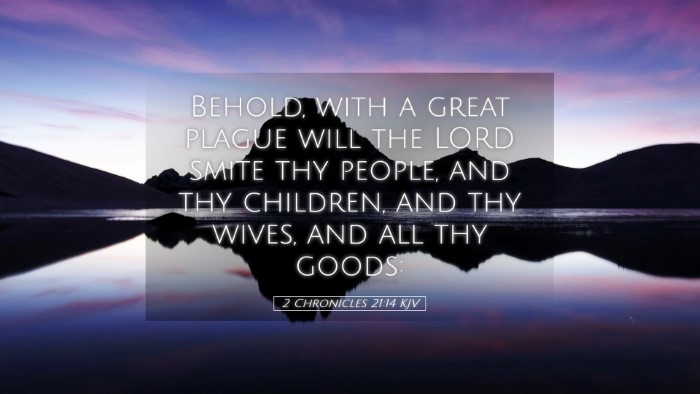Commentary on 2 Chronicles 21:14
2 Chronicles 21:14 reads: "Behold, with a great plague will the Lord smite thy people, and thy children, and thy wives, and all thy goods."
Introduction
This verse is part of the narrative concerning King Jehoram of Judah, who was rebuked for his idolatry and moral failures. Commentators such as Matthew Henry, Albert Barnes, and Adam Clarke provide insight into the consequences of Jehoram's actions and the significance of divine judgment in this historical context.
The Context of Jehoram's Reign
Jehoram, the son of Jehoshaphat, ascended to the throne of Judah after the death of his father. Henry notes that Jehoram's reign was marked by a departure from the faithful practices of his father, leading to his downfall. His marriage to Athaliah, the daughter of Ahab, introduced Baal worship into Judah, a direct violation of God's commands.
Barnes highlights the kingdom's moral decay under Jehoram's influence, examining the impact of his idolatrous practices not only on himself but on the entire nation. The plague mentioned in this verse signifies the righteous judgment of God against sin.
The Nature of Divine Judgment
This verse serves as a pivotal warning about the consequences of turning away from God's commandments. Clarke emphasizes that God's judgment is comprehensive, affecting not just the individual, but also the family, community, and nation. The phrase "great plague" evokes the severe ramifications of divine displeasure, a concept recurrent in biblical text.
- Nature of the Judgment: God’s judgment is not arbitrary but is a response to human behavior and sin, demonstrating His holiness and justice.
- Scope of the Judgment: The intended audience of God's judgment extends beyond Jehoram to his entire household, indicating the interconnectedness of leadership and its people.
- Significance for Israel: The plight of the Israelites during Jehoram’s reign reflects the spiritual and moral consequences of their king’s actions.
Theological Implications
The insights of these commentators reveal critical theological themes inherent in this verse:
- God’s Sovereignty: God's direct intervention in human affairs emphasizes His authority over nations and individuals alike.
- Sin and Judgment: The eternal principle that sin leads to suffering is vividly illustrated through Jehoram’s impending fate.
- Call to Repentance: The warnings issued through prophetic voices in scripture urge individuals and nations towards repentance to avoid such fate.
Lessons for Today
Modern readers can draw various lessons applicable to contemporary faith life and practice:
- Importance of Leadership: Ecclesiastical and secular leaders hold tremendous responsibility for moral stewardship and can influence the spiritual direction of those they lead.
- Consequences of Idolatry: The relevance of idols in contemporary life, whether materialism, power, or other distractions, emphasizes the need for vigilance in maintaining exclusive devotion to God.
- God's Mercy: Despite the stark warning of the plague, the narrative of scripture often highlights God's willingness to forgive upon genuine repentance, showcasing His mercy.
Conclusion
In summary, 2 Chronicles 21:14 serves not only as a historical account but also a profound spiritual lesson on the consequences of turning away from God. The commentaries by Henry, Barnes, and Clarke offer valuable insights that are crucial for pastors, students, theologians, and scholars in their understanding of Scripture. Engaging with the text at this depth encourages a holistic approach to faith that encompasses both personal and communal dimensions, urging readers to consider their paths and seek alignment with God's will.


